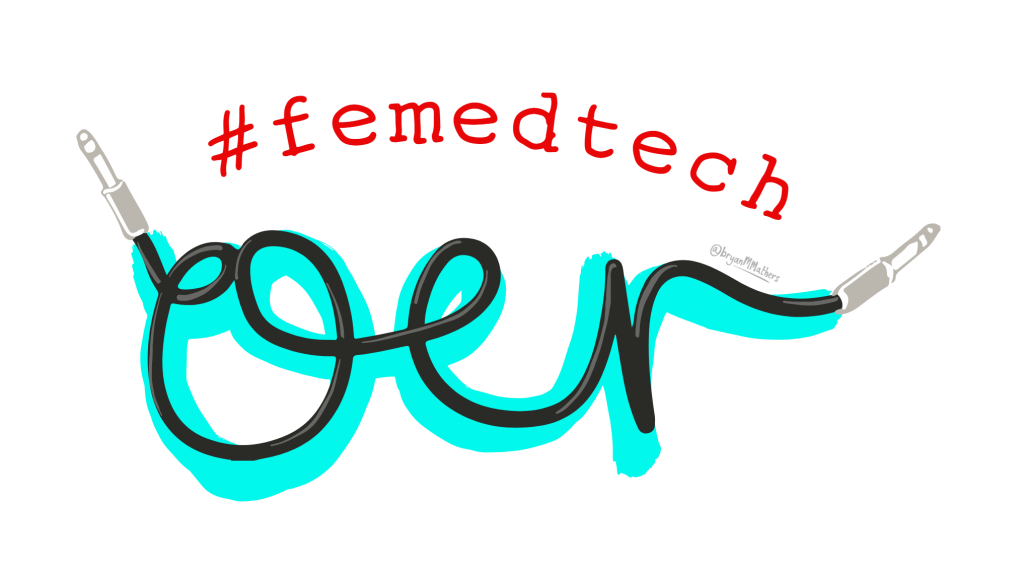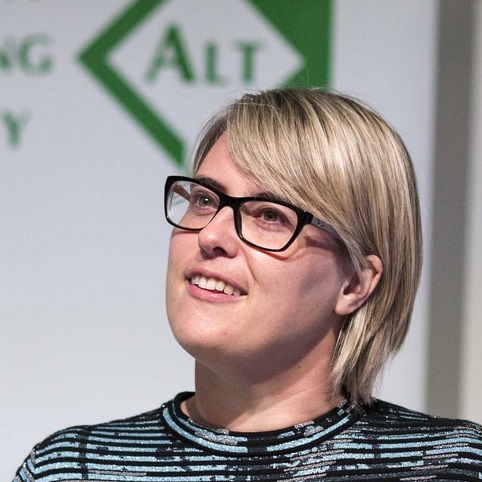As a women working in edtech, open education, and higher education, the #femedtech network has provided hope, joy, and encouragement for me and many others working within the space. Although Maren and I have never met in person, I am a Twitter friend and I invited her to write a WCET blog post exploring the #femedtech movement and network. I can’t wait to attend the Open Ed 19 conference and meet her and all the other amazing people who make up the #femedtech network face-to-face.
I truly believe that when we work together for equity, good things happen—and the #femedtech network is no exception… but you’ll have to read Maren’s blog post to find out the details!
– Tanya Spilovoy, WCET
If you are interested in equality in educational technology or if you are a feminist working in the industry or if you are curious to find out how a grassroots Twitter network is making change happen, then this post is for you – welcome!
My name is Maren Deepwell and my day job is as chief executive of ALT, the Association for Learning Technology in the UK. ALT is the leading professional body for Learning Technologists in the UK. In that capacity, I am particularly interested in how we can support women in the industry and promote equality for all. But I also volunteer in my personal capacity as an activist in the #femedtech social media network. Today’s post is about the #femedtech network. Our goal is to create a network open to colleagues of all nationalities, races, ethnicities, sexualities and genders (see our values later in the post).
What is #femedtech
If you haven’t come across us, here is a short intro from the #femedtech open space:
“We are a reflexive, emergent network of people learning, practicing and researching in educational technology. We are an informal organization with no funding: our resources are our passion, kindness, knowledge, enthusiasm and volunteer time.”
femedtech emerged in 2016 after discussions at a social occasion attended by UK women working in Educational Technology. After extended explorations, the name and concept of the network was established, femedtech: reflecting feminist perspectives on the domain of Education Technology. femedtech appeared as a Twitter hashtag #femedtech (slightly later as a Twitter account @femedtech) and a website, femedte.ch (now defunct). The first website proved to be unsustainable for the femedtech network, while the Twitter account and hashtag became the identity for network.
Curating for the Network
In April 2018, femedtech adopted an approach that had been considered for some time: shared curation, inspired by the approach of @IndigenousX. @IndigenousX is a Twitter user whose approach to including different voices and perspectives helped us find our own. Volunteers signed up via a simple online space for two week curation slots, choosing their own theme and approach.
My personal experience of being a curator of the network really opens up new perspectives for me. Curating helps me get into the mindset of being a volunteer (and my day job relies heavily on the goodwill of volunteers, so that is particularly helpful for me) and it’s a powerful reminder that whilst we are making a lot of progress, there is always so much more to do to create a more equal and equitable society. If you’d like to find out more, you can read my post on ‘a day in a life of a #femedtech curator’.
But promoting gender equality is not something that I see as a women’s issue or something that should be confined to all-female networks or even International Women’s Day. Everyone is welcome to join in and become active and in this podcast I discuss the experience of curating the community with the network’s first ever male volunteer curator, Martin Hawksey, who said: “Blind spots is one of the biggest challenges, not just within the workplace, but society as a whole. Before attitudes and approaches can be changed the issue first has to be acknowledged. In the case of gender, I think a lot of guys don’t see a problem, or even if they do see it as a problem it is something that they shouldn’t be concerned about.”
femedtech Network Creations
Our community gathers together digitally (and sometimes in person) to create resources, publications, materials, references, and more. We primarily use Twitter, a SPLOT WordPress site hosted by Reclaim Hosting, and collaborative tools like Google Docs.
 One of our creations was this openly licensed slide-deck for International Women’s Day.
One of our creations was this openly licensed slide-deck for International Women’s Day.
That leads me to one of the biggest parts of the network’s activities: organizing activities around conferences, where members who are not usually able to see each other person get together.
One example of this was the OER19 Conference for which members of the network launched the #femedtech open space.
This open space continues to grow and now includes contributions about:
And many other posts that I invite you to browse, read and hopefully contribute to.
Network Growth
As the network grows, one of the questions we have continued to explore is that of our values. We want to create inclusive spaces to gather and speak. This will be an ongoing challenge. This led to an activity around our values that I feel really helps to understand what is at the heart of what we do:
Our name, femedtech (feminist education technology), aligns us with a critical perspective on education/technology. We want to be alive to the specific ways that technology and education are gendered, and to how injustices and inequalities play out in these spaces (which are also industries, corporations, and institutions). We also want to celebrate and extend the opportunities offered by education in/and/with technology – to women, and to all people who might otherwise be disadvantaged or excluded.
Though the initial conversations that led to the creation of the femedtech network took place during a social gathering of western women working in education technology, it has always been the intention of femedtech to be open and welcoming to colleagues of all nationalities, races, ethnicities, sexualities and genders. This network belongs to all those who participate in it. We actively seek out like minded networks organized by similar values and principals and we strive to align with and work alongside them. We bring our energies to their work, and we try to acknowledge and support their work through femedtech. We want to actively include and listen to people who are marginalized in different ways in the spaces and contexts of education (formal and informal) and technology, and we acknowledge the power imbalances that exist in those spaces.
I hope that as you read this, you might find sparks of hope and inspiration and that you might click on some of the links, follow us, and start to engage. We will welcome you at #femedtech and look forward to hearing about projects, initiatives, or groups that have similar values.

Maren Deepwell, SCMALT
Chief Executive
Association for Learning Technology (ALT)
twitter: @marendeepwell


 One of our creations was this
One of our creations was this 

1 reply on “Building a Network for Curation – the #femedtech movement”
WCET (WICHE Cooperative for Educational Technologies) is a division of the Western Interstate Commission for Higher Education